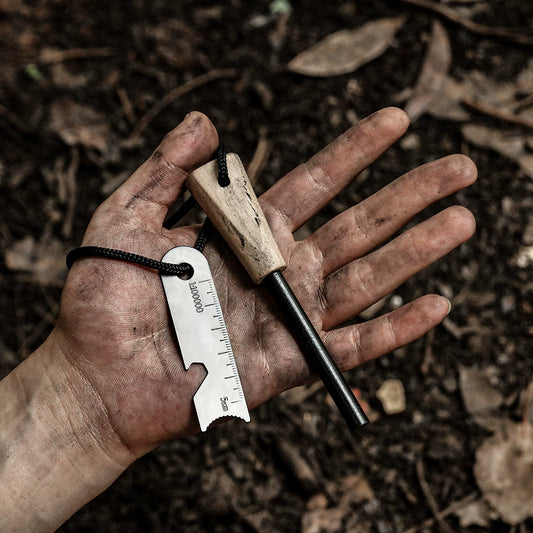Collection: Real Tool For Kids
Engaging with the natural environment fosters both personal well-being and ecological stewardship.
An increasing amount of research suggests that for individuals to flourish in a balanced relationship with nature, it is essential to recognize the significance of incorporating it into our daily lives. Individuals across various age groups who engage in nature-oriented activities generally exhibit greater happiness and improved health compared to those who do not.
“Nature play refers to the opportunities afforded to children for unstructured play in outdoor environments that include natural elements such as logs, rocks, and water, rather than traditional manufactured play structures. It allows children to invent their own play using the features of nature,” explains Associate Professor Janet Dyment from the School of Education at the University of Tasmania.
Interacting with nature through play is a straightforward yet impactful activity that can yield substantial advantages for children. When outdoor play is combined with educational experiences in nature, the children in your care—whether they are family members or students—can grow into resilient, joyful, and engaged individuals.
Therefore, take your children to a park, your backyard, the beach, or a natural reserve, and allow them the freedom to express themselves. Encourage them to play, explore, challenge their limits, discover, and create. Bring nothing along and offer your support only when they seek it.
Let the natural world provide its own guidance and nurturing.
-
Large Wooden Pine Nature Guide View finder
Regular price $16.00 AUDRegular priceUnit price / per$15.00 AUDSale price $16.00 AUD -
Kids children nature explorer handy TELESCOPE
Regular price $18.00 AUDRegular priceUnit price / per$14.00 AUDSale price $18.00 AUD -
Wooden Sweeper Dustpan Mop Duster Brush Cleaning Kit with Hanger
Regular price $48.00 AUDRegular priceUnit price / per -
Kids children nature explorer Whittling Gloves Various Sizes
Regular price From $8.50 AUDRegular priceUnit price / per$14.00 AUDSale price From $8.50 AUDSale -
Kids Whittling Peeler Peeling Knife Natural Explorer Tool Toy
Regular price $8.50 AUDRegular priceUnit price / per$10.00 AUDSale price $8.50 AUDSale -
3 Sensory Play Sand Sieve + 2 Plastic Sand Scoops
Regular price $20.00 AUDRegular priceUnit price / per$25.00 AUDSale price $20.00 AUDSale -
Large Stainless Steel Wide Mouth Pouring Funnel Kids Messy Play Tool
Regular price $7.95 AUDRegular priceUnit price / per$10.00 AUDSale price $7.95 AUDSale -
Kids Vegetable Crinkles Wave Cutter Blade Sensory Play Dough Wavy Slicer
Regular price $7.95 AUDRegular priceUnit price / per$10.00 AUDSale price $7.95 AUDSale -
Kids Wood Caving Tool Retractable Pocket Whittling Knife
Regular price $15.00 AUDRegular priceUnit price / per$25.00 AUDSale price $15.00 AUDSale -
Kids Children Real Tool Nature explorer Hand Drill 6mm
Regular price $39.00 AUDRegular priceUnit price / per$70.00 AUDSale price $39.00 AUDSale -
Kids Children Palm Hand Drill Real Tool for Natural Forest School Play
Regular price $11.00 AUDRegular priceUnit price / per$20.00 AUDSale price $11.00 AUDSale -
Kids Adventure Wood Scrapper and Flint Striker Campfire Fire Starter
Regular price $7.95 AUDRegular priceUnit price / per$10.00 AUDSale price $7.95 AUDSale -
Kids Wood Caving Tool Retractable Pocket Whittling Knife Rounded tip
Regular price $15.00 AUDRegular priceUnit price / per$25.00 AUDSale price $15.00 AUDSale -
Montessori Children Kids Practical life Skill Knife and Cutting Board Set
Regular price $18.00 AUDRegular priceUnit price / per$25.00 AUDSale price $18.00 AUDSale -
Chestnut Holder & Nutcracker Mushroom Nut Cracker Tool Toy
Regular price $16.00 AUDRegular priceUnit price / per$21.00 AUDSale price $16.00 AUDSale -
Kids Stainless Steel Dumpling Maker Mold Dough Press Tool
Regular price $7.50 AUDRegular priceUnit price / per$10.00 AUDSale price $7.50 AUDSale -
Kids Children Woodwork Real Tool Hand Brace Drill
Regular price $45.00 AUDRegular priceUnit price / per$65.00 AUDSale price $45.00 AUDSale -
Kids children Stainless Steel Mini Tongs Sensory Messy Play Tool Toy
Regular price $3.50 AUDRegular priceUnit price / per$5.00 AUDSale price $3.50 AUDSale -
Kids Cardboard Double Sided Saw Construction Tool Children Explorer Box Cutter
Regular price $7.95 AUDRegular priceUnit price / per$10.00 AUDSale price $7.95 AUDSale -
Wooden Kids Stainless Steel Danish Dough Whisk Kitchen Egg Real Tool
Regular price $12.00 AUDRegular priceUnit price / per$18.00 AUDSale price $12.00 AUDSale -
Kids Hand Drill Rotation Woodwork Manual Pole Drill
Regular price $55.00 AUDRegular priceUnit price / per$60.00 AUDSale price $55.00 AUDSale




















